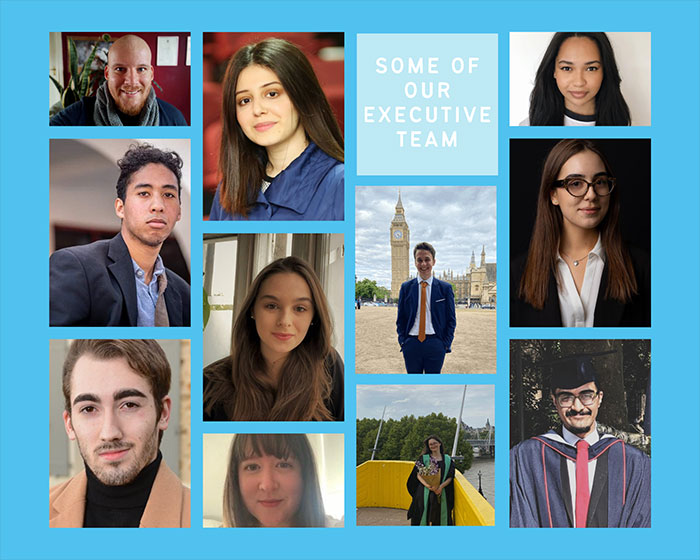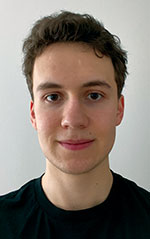How One FS Kid Created a Human Rights Organization
Building a pro-bono human rights research group gave university student volunteers from around the world valuable, real-life career experience—and made a difference, too.
BY AIDAN GORMAN

From top left, by column: Samuel Jardine, James Sanchez, Alexis Cabello, Laraib Zehra, Kaitlyn Whitsitt, Leanne Curran, Aidan Gorman, Jennifer Young, Caleigh Plaatjes, Tamila Shvyryda, and Sukhpal Garcha.
Courtesy of Aidan Gorman
In 2021 I left Moscow, where my family was posted, to start university in the U.K. I knew I wanted to study international relations and eventually join the Foreign Service like my dad. I loved interning at embassies abroad, and studying international relations in a foreign country strengthened my determination to become a diplomat. During my first summer at university, I chose to stay in the U.K. instead of going “home” and interned for the Global Peace Foundation, a peacebuilding organization. I was fortunate to attend a conference on freedom of religion or belief with 800 people from other NGOs, political organizations, and governments.
One of only a handful of young people there, I was inspired to encourage other college students to participate in this field. I began thinking about establishing a human rights research group led entirely by volunteer university students from around the world. I reached out to some students at my university and other universities to ask if they would help lay the groundwork for such an organization. The response was fantastic.
Here is the story of how we built the pro-bono human rights research organization GorStra Research Group, what it does, who it serves, and how the experience helped me prepare for a career after college.
Building a Human Rights NGO
The idea of starting an organization from scratch was daunting, but being a Foreign Service kid helped. I was used to meeting new people and operating in an online world, so I was able to find other students around the world, interview them, and ask for outside help from experts whom I’d met while living overseas. The startup costs were minimal—after paying for a domain name, I created my own website, asked a friend to create the logo, and used free communication software. There was a lot of interest from other students, so I interviewed several dozen and chose the first few based on their areas of interest as well as writing skills, allowing us to cover multiple regions.
GorStra currently has more than 50 university student volunteer analysts located in more than a dozen countries around the world. Modeled after the State Department, we have regions and issues organized by “desk”—e.g., the Europe desk or gender inequalities desk. This division makes the website more easily navigable and gives our analysts the opportunity to specialize, which we hope will make us more attractive to future employers.
Volunteer analysts select their “desk” of choice and begin working with a team of other analysts interested in the same area. Despite the fact that we are located in different countries across the globe, desk analysts can easily bounce ideas off each other—reports are sometimes written conjointly, and everyone learns something from other volunteers! Each desk is led by a senior analyst and desk director—volunteers who have been with us from the earliest days of GorStra and have proven their leadership skills.
What GorStra Does
As a pro-bono human rights research group, we focus on human rights issues around the world. We offer both public-focused and client-directed research. Our public side develops concise reports focusing on specific human rights issues of interest to our analysts.
We analyze important, yet under-discussed issues using locally based sources, often in the language of the country on which we are reporting, along with open-source intelligence. We then publish these in-depth reports on our website and on social media. It is surprising how little information on global human rights makes it to the world stage and gains public attention—even the most experienced diplomats have gaps in knowledge, and we can help fill those gaps. Our main goal is to help push information forward, drawing public attention to critical human rights issues they might otherwise not know about.
Our main goal is to help push information forward, drawing public attention to critical human rights issues they might otherwise not know about.
On our client side, we provide free research services to NGOs, charities, and other organizations in the field. Small charities, for example, often need to put all their resources into fundraising, which makes hiring a researcher prohibitively expensive. We help by providing free, bespoke, in-depth research reports on a human rights topic of importance to their organization. Students are the perfect researchers: We already have to do so much in-depth analysis for school, so why not turn our academic writing skills into professional ones?
We have provided research assistance for organizations around the world, including Humanists U.K., the Global Peace Foundation, and Children of Heroes Ukraine. Different analysts work with each of these organizations, giving these students valuable experience in the professional sector as they prepare to enter the working world after school. Our volunteers can gain important, meaningful experience in just four to six hours a week.
From the Field: Advice for College Students
Foreign Service kids have grown up living around the world. But how do we decide what we want to do after we graduate? This is a challenge for FS kids and, in fact, for college students everywhere. And, once you decide what to do, how do you get your foot in the door? Our experience has taught us some lessons.
Look Around. Take a look at the work already being done at your local level—in your city, at your university, or even internationally. You’ll find many people doing great things, and you might find someone who is doing exactly what you want to do. Ask to speak to them, just to learn more about what they do. They might have advice for how to jumpstart your career during university. If you don’t find anyone doing what you want to do, you can do it yourself! Just start on a smaller level, and grow it from there.
Use Your Contacts. Do not be afraid to reach out to people in the Foreign Service who worked with you or your parents. They can be a big help, whether it be through offering career advice or pointing you toward a job opening they’ve heard about. For example, one senior-level public diplomacy officer who served in Moscow at the same time as my family was able to give me useful advice as I started GorStra, and even offered some ideas on where I can take it after I graduate. People you know are often happy to help—even if they remember you simply as the high school intern.
Stay Balanced. It’s hard to balance your personal life, school life, and work life. Try to maintain a good balance so you don’t burn yourself out. Schedule important tasks so you don’t fall behind in school, at work, at the gym, or even at the grocery store. Experiment with what is too much, too little, and just right when you are managing everything you need and want to do.
I have one year until graduation—it takes just three years to complete a bachelor’s degree in England. After graduation, I plan to continue leading GorStra while I apply for a position as a Foreign Service officer. I hope it grows to become an established, well-known organization in the coming years.
In the meantime, my team and I have gained valuable, real-world experience for future careers while helping make a difference in the world. There is always more to learn and do, no matter where you land after life as a Foreign Service kid.
When sharing or linking to FSJ articles online, which we welcome and encourage, please be sure to cite the magazine (The Foreign Service Journal) and the month and year of publication. Please check the permissions page for further details.
Read More...
- Peace, Conflict, and Peacebuilding with Professor Oliver Richmond, GorStra Spotlight Podcast, March 2023
- “All About Internships” by Jacob Borst, The Foreign Service Journal, December 2019
- From the FSJ Archive: Human Rights in Foreign Policy, The Foreign Service Journal, June 2020




